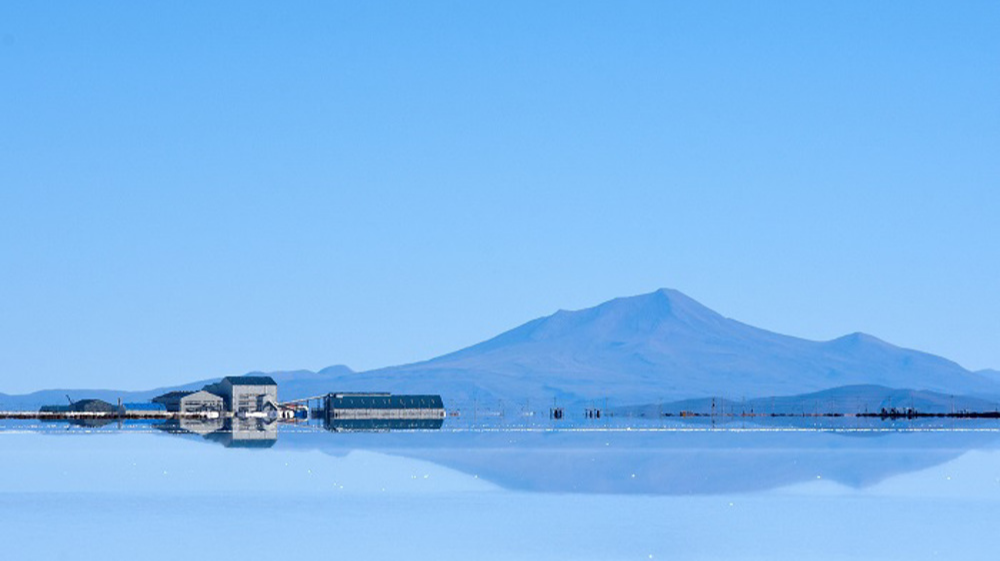
Bolivian state firm YLB's plant is seen at the Salar de Uyuni, a vast white salt flat at the center of a global resource race for the battery metal lithium,
(Via Reuters)
La Paz, July 1 (RHC)-- The Bolivian government has signed lithium agreements with Russian state nuclear firm Rosatom and China's Citic Guoan Group as the South American country looks to develop its untapped resources of the battery metal.
Minister of Hydrocarbons and Energy Franklin Molina said Thursday that the investments would allow the construction of two direct lithium extraction (DLE) processing plants in the towns of Pasto Grande and Uyuni Norte, where at least 45,000 tonnes of lithium carbonate would be produced per year.
"With these deals our country will be able to produce some 100,000 (metric) tons of lithium carbonate in 2025 in the Uyuni, Coipasa and Pasto Grandes salt flats," Molina said at an event in La Paz, the administrative capital of Bolivia.
The deals, which envisage total investment of $1.4 billion, follow a similar agreement in January with giant Chinese battery maker CATL, a potential win for Beijing in its efforts to lock in supply of the metal used in electric vehicles. CATL is the world's largest EV battery manufacturer but does not currently produce any lithium.
Russia’s Rosatom, which bid via its Uranium One Group unit, also confirmed the news, saying it would invest $600 million in the project, its first large-scale lithium venture overseas, with a planned annual capacity of 25,000 tonnes of lithium carbonate.
“There is the possibility of increasing capacity based on the results of geological exploration work,” Rosatom’s First Deputy General Director Kirill Komarov said in a statement.
Elsewhere in his remarks, Molina said Citic Guoan would invest $857 million and would also “look at investing in battery plants and the installation, possibly with technical studies, of a vehicle assembly plant, to create a true electric transport revolution”.
The deal with Uranium One Group was for feasibility and pre-investment studies, he said, adding that multiple tests with Russian technology on the salt flats had shown a lithium recovery rate of more than 80 percent, with a purity of approximately 99.5 percent.
The agreements could help finally unlock Bolivia's huge potential as a supplier of lithium for batteries needed to power the global shift to electric vehicle
Bolivia's iconic salt flats are home to the world's largest lithium resources at 21 million tons, according to the US Geological Survey, but the country has almost no commercially viable reserves.
In March, Bolivian President Luis Arce said he would be willing to jointly design a lithium policy with other Latin American countries to benefit their economies. "We must be united in the market, in a sovereign manner, with prices that benefit our economies, and one of the ways, already proposed by (Mexico's) President Andres Manuel Lopez Obrador, is to think of a kind of lithium OPEC," Arce said back then in a speech in La Paz.
The objective is to position Bolivia, Chile, Argentina and Peru "as potential promoters of new forms of energy storage that will make it possible to overcome the use of fossil fuels," the president added. Arce expressed concern about foreign meddling in the lithium business, in particular from the United States.
"We don't want our lithium to be in the Southern Command's crosshairs, nor do we want it to be a reason for destabilizing democratically elected governments or foreign harassment," he said.
Governments, mining firms, battery markets and carmakers worldwide are scrambling to secure a supply of the metal, which is needed for many of the batteries being used to power a big shift towards electric vehicles.
Demand for lithium, used in rechargeable batteries for cars and electronics, pushed prices for battery-grade metal to around $85,000 per tonne at the end of last year.

